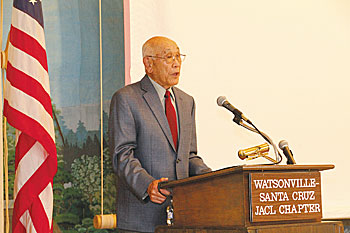
It was standing room only in the hall listening to Japanese-American Citizens League Board Member Mas Hashimoto ask, “How can a nation suspend the Constitution?” The answer: “Racism.” He showed us a 30-minute film called “Days of Waiting,” the story of a Caucasian artist, Estelle Peck, who in 1929 had to go to Mexico to marry her sweetheart, Nisei Arthur Shigeharu Ishigo. It was against the law for them to wed in the United States. When Arthur was ordered to report to Pomona Assembly Center, Estelle chose to go with her husband to a “relocation” camp at Heart Mountain, Wyoming. Her documentation in drawings and paintings of life there gave a moving portrait of the lives of the internees. The film won the Academy Award for Documentary Short Subject in 1990.
The camps were disbanded after the war ended and the internees were released in late 1945 and early 1946. They went back to their West Coast “homes” in towns such as Watsonville and other cities. Some families were lucky: the American friends and neighbors they had entrusted their property to returned it to them. Some Americans even farmed their Japanese-American friends’ farms for them until they were released.
Other families were not as lucky: unable to get their property back from not-so honorable “friends” and neighbors, they had to start all over again to establish themselves.
Jeanne Wakatsuki Houston’s 1973 autobiography, “Farewell to Manzanar” tells how, when returning to their hometown, they learned the warehouse where her family’s belongings were stored had been unaccountably “robbed” of furniture, appliances, and everything of value. Her father had owned several fishing boats — there was no record them. These too had unaccountably “disappeared,” leaving the family with no way to earn a living. This was by no means a unique story; many others suffered in the same way.
The Japanese American Citizens League worked for many years to get redress and the passage of the Civil Liberties Act of August 10, 1988. The difficulties were almost insurmountable: from disagreement among the JACL members as to whether or not redress should include monetary reimbursement to running through all the Congressional hoops and overcoming the politics involved. The turning point came in the 1980’s when the JACL formed the Legislative Education Committee (LEC) and asked Grant Ujifusa, originally from Wyoming but by then an editor at Random House, to serve as strategy chairman. Under his able leadership, his important connections and perseverance, the bill crept along slowly through Congress.
It was a stroke of genius to name the bill H.R.442 in honor of the all-Japanese 442nd Infantry Regiment that saved the “Lost Battalion” (Originally part of the Texas National Guard) in France when it was surrounded by Germans. The 442nd Infantry Regiment is said to be the most-decorated infantry regiment in the history of the U.S. Army with eight Presidential Unit Citations and twenty-one of its members awarded the Medal of Honor in World War II. Two of the 442nd veterans were in the audience and were recognized with a hearty round of applause.
Mr. Ujifusa gave us a further overview of the painstaking process it took to get this done in Washington. He said that for a long time the only states’ representatives who supported the bill were those from Texas, who remembered the 442nd Infantry Regiment’s heroic actions in WWII.
Ultimately the Civil Liberties Act — sponsored by California’s Democratic Congressman Norman Mineta, an internee as a child, Wyoming’s Republican Senator Alan K. Simpson, who first met Mineta while visiting an internment camp, and California’s Republican Senator Pete Wilson – which included reparations of $20,000 redress for each internee still living, was signed by President Ronald Reagan on August 10, 1988.
While Mr. Ujifusa was assiduously working in Washington, Ben and Yoko Umeda of Watsonville led the local chapter’s redress and reparation campaign from 1980 to 1984 soliciting funds for the cause. Their first letter requesting support drew very little response. They sent a second letter and persevered until they were able to collect $58,834.50. The Umedas and Grant Ujifusa were honored for their outstanding efforts. Names of the local donors in the 1980-84 campaign were read aloud and donors or family members of donors were asked to stand to be acknowledged.
To end the remembrance ceremony, the youth in the audience were called upon to escort an internee, or the relative of an internee, to the table of photographs where the former internee placed a rose in front of the picture of the camp where they had been interned.
You can’t help but admire these citizens for their courage and perseverance and especially for using legal means to redress a gross injustice committed against our own citizens.